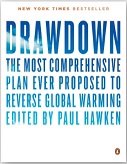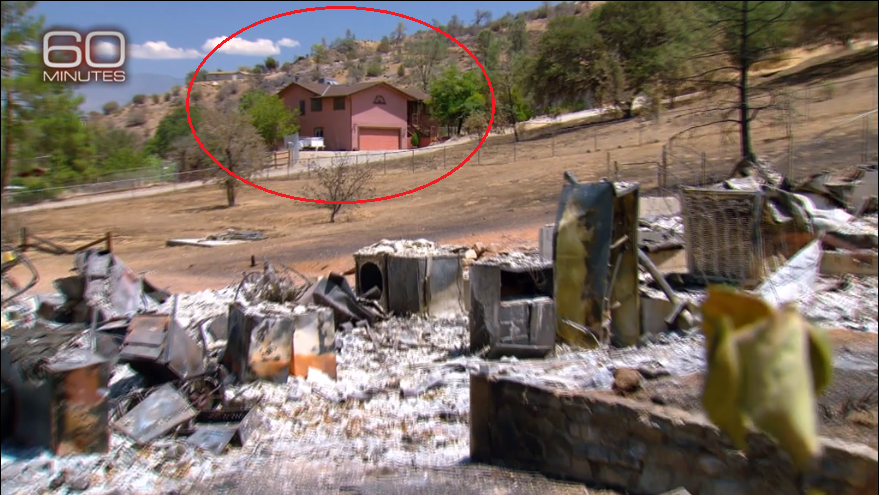DrawDown #5: Is Recycling Worth It?
 There's no time right now to slow down, read, prepare food, invite people over and discuss two chapters from project DrawDown in hopes of correcting climate change. Since there's no time, we have to make time, and we're doing that right now. Join us!
There's no time right now to slow down, read, prepare food, invite people over and discuss two chapters from project DrawDown in hopes of correcting climate change. Since there's no time, we have to make time, and we're doing that right now. Join us!
 Grab a virtual plate - today's nosh is a salad made with re-hydrated seaweed, asame seaweed specifically, inspired by the sea-farming segment we saw last week on 60 Minutes. Correspondent Leslie Stahl reported seaweed farming is starting to take off, removing carbon dioxide from the ocean. And seaweed's in such high demand, sea farmers can't produce fast enough, and are recruiting entrepreneurs and ex-fishermen to set up ocean plots, plant water crops, and join the craze. We searched three grocers before finally purchasing dried asame seaweed online.
Grab a virtual plate - today's nosh is a salad made with re-hydrated seaweed, asame seaweed specifically, inspired by the sea-farming segment we saw last week on 60 Minutes. Correspondent Leslie Stahl reported seaweed farming is starting to take off, removing carbon dioxide from the ocean. And seaweed's in such high demand, sea farmers can't produce fast enough, and are recruiting entrepreneurs and ex-fishermen to set up ocean plots, plant water crops, and join the craze. We searched three grocers before finally purchasing dried asame seaweed online.Lots of climate change-related news items were published since we last met for a DrawDown discussion March 30. One published story reported people are giving up on recycling, (which was sad, but in Reading #1 below we found out why.) And cities are outlawing plastic straws, which strikes us as so "small-ball." (This writer covered the debate that led to the first plastic bag ban in the U.S. for the San Francisco City Star, and at week's end the issue aired on the PBS Newshour. Not bad for a middle-brow state college grad who is a reporter but actually a programmer.) Then McDonald's said they're testing paper straws and that struck us as strange. Intrigued, we made time, messaged friends to read two chapters, come over and discuss them for DrawDown bookclub meeting #5!
We chose for this week's readings: "Household Recycling", page 158 and we accidentally read "Conservation Agriculture" on page 60 instead of our desired topic "Composting" on page 62. We'll cover the first two below.
I. Review
II. Household Recycling, page 158
III. Conservation Agriculture, page 60
IV. Next Readings
I. Review
 In the first four meetings of DrawDown bookclub we covered many topics, which myself and other bookclub members testify has "re-trained the eye" to notice different news stories, and many, many innovation opportunities in our daily lives that will draw carbon down. One bookclub member invented a product to replace instances of single-use plastic, and began filing a patent!
In the first four meetings of DrawDown bookclub we covered many topics, which myself and other bookclub members testify has "re-trained the eye" to notice different news stories, and many, many innovation opportunities in our daily lives that will draw carbon down. One bookclub member invented a product to replace instances of single-use plastic, and began filing a patent!Which brings me to this question: Hey, mayoral candidates of San Francisco, can we convert this shuttered Sunset District gas station, into a microgrid electric-car filling station of the future? Powered by solar panels, as clean and beautiful as the mockup-graphic (below)?
Our future mayor could work with: PG&E, to adapt the microgrid to their macrogrid; the small business owner who closed shop and wants to reopen; and Chevron or General Electric from San Ramon to implement those electric car charge pads (like the smartphone charge pads on Starbucks tables.)
This would please voter coalitions Across. The. Board. To wit:

- apartment dwellers(!) who want to buy an electric car but don't because they lack permission to install a charger in their building's garage
- voters concerned about climate change
- voters who like to see a mayor who makes things happen ("Mayor X gets it done!" could be your re-election slogan)
- voters pleased to see you willing to work with corporations (Republicans) when it facilitates positive change
- small business owners!
Onto this week's readings...
II. Household Recycling, page 158
The word "recycling" did not exist until the 1960s, the book tells us. Before the 20th century, people were so short on manufacturing materials, they reused, repaired everything they could. But after 60 years of "take, make, waste" that is our modern manufacturing cycle, Canadian group "Pollution Probe" coined the Three R's - "reduce, reuse recycle."
(Quick popular culture sidebar: did anyone see either "The Crown" on Netflix, or "Darkest Hour" in movie theaters? Both featured subplots on the blinding smog plaguing cities like London at the time, and reminded we've made strides cleaning our environment before now.)
ADD! Stay focused, back to the book:
Waste production doubled in the last 100 years, the book says. And "is expected to double again by 2025"? Waste doubled in the last 100 years, and is expected to double again in the next ten???
"Paper, plastic, glass and metal" comprise 50% of waste in high-income cities, and are all "prime candidate" materials that can be recycled (surely plastic is the most difficult to recycle?)
Diverting materials from landfills, and recovering them from pre-incinerated waste heaps, is called "valorization" by specialists. (Who cares what it's called? Keep reading.)
---Hopeful Sidebar: in our March 30th bookclub meeting discussion of Industrial Recycling, page 160, we wrote:
Recycling technologies are young and have room to evolve, the book says. And that's possible with sensors and robotics. A decade ago I read about mechanized garbage sifters that teased out recyclable trash from the plant's waste piles. Did it get past the design phase? Anyone out there know?Well well well, Google must have read our blog and placed this story in our Twitter feed: Bloomberg reported last year in Danish company Dong turns trash into energy that Dong A/S corporation "is working on new machines that sort household trash from recycling, while rapidly breaking down organic materials like food to create power from biogas produced by the process." Huzzah. ---End Hopeful Sidebar, back to book chapter.
Recycling rates vary across cities, DrawDown says. And bringing the "laggards into line with the front-runners is the opportunity at hand." This was interesting: recycling rates of "low-income cities are already competitive with what formal systems accomplish in high-income cities."
Some cities use pay-as-you-throw policies - like San Francisco, which charges only for garbage collected in the black waste bins, but picks up waste diverted to blue (recycling) and green (compost) bins free-of-charge.
 Sidebar of Terror ---China stopped taking our recycling, npr reported in January, and it's piling up.
Sidebar of Terror ---China stopped taking our recycling, npr reported in January, and it's piling up. This is trickling down to New Bedford, whose garbage pickup company is no longer willing to pick up recycling for free. The mayor is bargaining hard, threatening to contract with another waste collector, but the trend is clear. And this could be why cities all over are talking about banning plastic straws.----End Sidebar of Terror, back to book chapter.
The makeup of garbage is the challenge still facing us: the newer plastics, which are lighter and require less raw material to manufacture, are more expensive to recycle and "it takes many more of them to reach the same volume of salable commodities." Aha! That's probably why places like China are refusing to accept recycling collections, and why cities in Canada, are now proposing complete bans on single-use plastic.
"These changes couple with the inevitable volatility of global commodity markets to keep the [recycling] industry on its toes."
The chapter closes by mentioning a German "green dot" or "Der Grune Punkt" labeling system which gathers funds from manufacturers to cover recycling costs (which incentivizes manufacturers like Apple to roboticize their own recycling, or Dong which will probably sell its recycling services to manufacturers.) And the EU has proposed a 65 percent trash diversion goal by 2030.
/End Chapter. Find more links at the bottom of this post.
III. Conservation Agriculture, page 60
This chapter is quick and less boring than it sounds. It starts with a recurring theme:
- For years humans did not till soil.
- Then tilling was this ingenious technological breakthrough.
- Lately: soil is less nutritious, drier, and requiring ever-more fossil-fuel based fertilizer to grow crops.
- Now the modern innovation: "no-till farming" is the latest, greatest technology!
Vocabulary time: "conservation" is based on the Latin rood "conserve" that means "to keep together."
"Conservation agriculture" comprises more than no-till farming. It builds off three practices:
- minimize soil disturbance
- maintain soil cover with "cover crops"
- rotate crops when possible
- minimizes need for fertilizer,
- makes for nutritious soil
- helps soil and land surface retain both: moisture and sequestered CO2!
- droughts
- floods
- dustbowls (obviously)
Smaller farmers who lease instead of own their land need investor$. "The core challenge to scaling it is the gap between up-front investments and the gains they ultimately bring."
Foundations or someone out there who cares could fund (or exploit) small farmers to convert their equipment and harvest schedules and materials toward conservation agriculture.
IV. Next Reading
These next two chapters may sound boring but remember: 1) at the next bookclub meeting someone will serve food, and 2) we always feel better after discussing two chapters of this book and 3) there won't only be food, but stellar company too.
For next week let's read something this bookclub host has been resisting for aesthetic reasons: let's read "Wind Turbines" page 2. (Wind turbines strike me as terrifically ugly!)
Technologies in this book would benefit from some savvy industrial design makeovers. But wind turbines are ranked by the book as #2 in terms of moving the most CO2 back in the direction we want.
And for our second chapter let's jump to another section for variety, let's read something we should get out of the way before the big, brawny chapter topics next month. Let's read "Composting" page 62, it will be more engaging than we expect, I suspect.
Thank you for coming, see you next week!
-------------
Further Reading:
Apple's phone-recycling robot "Daisy" debuted just ahead of Earth Day. engadget.com
Catch up:
- March 01 DrawDown Bookclub is Here!
- March 09 DrawDown Bookclub #1: Reading 'Why Bother' Was a Wise Choice
- March 16 Meatlover's DrawDown Bookclub #2: Can We At Least Have Fish?
- March 24 DrawDown Bookclub #3: Future Energy Storage More Fascinating Than First Appears
- March 30 DrawDown #4: MicroGrids and Industrial Recycling

This work by AJ Fish is licensed under a Creative Commons Attribution-NonCommercial 4.0 International License.



